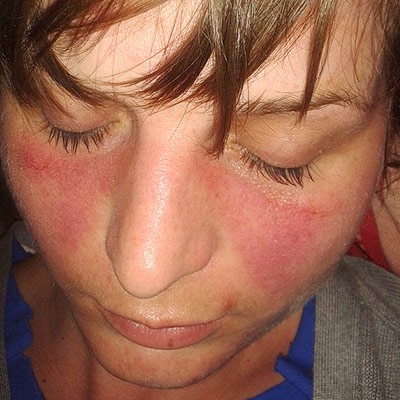PH or Pulmonary Hypertension is a disease that causes high blood pressure in the lungs due to narrowing in the pulmonary arteries by thickening of the vessel walls. It results in the heart having to work harder to pump the blood and the organ can become enlarged and weakened leading to heart failure. It can be caused by an underlying disease such as Lupus.

Lupus is a less common disease that many people haven’t heard of. It is an autoimmune disease that occurs when the immune system attacks healthy tissues resulting in inflammation, swelling, pain and cell tissue damage. There are different types of Lupus but the most severe is systemic lupus erythematosus (SLE). Symptoms range from mild to severe, and many people will have long periods with few or no symptoms before experiencing a sudden flare-up, where their symptoms are particularly severe. Even mild cases can be distressing and have a considerable impact on a person’s quality of life. Lupus is a complicated condition and common symptoms are fatigue, joint pain and swelling and rashes, however the disease can cause systemic damage and can effect organs like the kidney, heart and lungs.
They are both very separate diseases and PH does not cause Lupus however Lupus can cause PH. Patients suffer from shortness of breath, fatigue and fluid retention; symptoms also seen in patients with PH. The development of lupus-associated PH is not completely understood and “it is not yet known, for example, whether lupus itself can directly cause PH, or whether lupus is simply a trigger for the development of [PH] in susceptible individuals,” the report explains.
It is more common in female patients to develop lupus and PH at a younger age (15-50 years) than those that traditionally develop PH alone. PH can worsen the symptoms of Lupus and it is important to diagnose it early. Individuals should be aware of swelling in the feet, ankles, legs and abdomen, difficulty in breathing, chest pain, light-headedness and fainting.
There is currently no cure for either PH or Lupus but there are treatments that can help to ease the symptoms. Medications to help with inflammation, swelling and to ease blood pressure as well as measures to deal with fluid balance and supplemental oxygen to help with breathlessness and oxygen levels in the blood. Oxygen therapy helps with both diseases simultaneously; by helping to reduce inflammation and increasing blood oxygen levels which helps in tissue repair to reducing breathlessness, easing the hypertension and decreasing blood pressure among many other benefits. If Lupus is in association with the PH then immuno-suppressive medications can sometimes be administered which help with the inflammation and irritation in the body however they can also cause damage in the blood vessels in the lungs which can be counterproductive. Lupus is still very much an unknown disease and with time and understanding of its processes there will hopefully be more effective treatments in the future that could ease Lupus symptoms as well as PH symptoms if the patient suffers with both conditions.
References: http://pulmonaryhypertensionnews.com and http://www.nhs.uk




